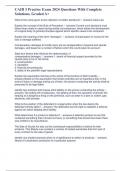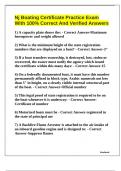Starting with the extract of Mr Utterson’s dream, explore how Stevenson uses the conventions of the
Gothic in his novel Dr Jekyll and Mr Hyde. (30)
Stevenson employs a plethora of gothic conventions within the novella “Dr Jekyll and Mr Hyde”, entailing
atavism and the concealment of a corrupt Victorian society within the form of dreams.
The Glossary of The Gothic refers to “Dreams invoking strong emotions within the dreamer, such as
ecstasy, joy and terror, dredging up deep emotions and premonitions that reflect tellingly upon the
dreamer. Subjects one might conceal during waking hours emerge in sleep, to haunt and arouse the
dreamer”. This is particularly prevalent within this provided extract of the novella. One could say this is
relevant due to its effortless place within literary tradition and the rejuvenation of Jekyll and Hyde as a
gothic piece of literature within Victorian England. Stevenson implements the use of a dream to convey
the symbolism of the secret acts in which are concealed under a somewhat respectable London. The
significance of Hyde’s "no face" further emphasises and compounds Stevenson’s tactical representation
of the character of Hyde as a universal symbol of hypocrisy, rigid dichotomy and repression.
It is clearly deliberate as to why he would present the character of Hyde in this way although, when
considering a Victorian audience. The revolutionary period entailing the uprise of pornography as a
product of sexual repression, the invention of tablecloths to cover indecent table legs and the constant
societal expectations of keeping deeds “private”. Contemporary historians have generally come to regard
the Victorian era as “a time of many conflicts, such as the widespread cultivation of an outward
appearance of dignity and restraint, together with serious debates about exactly how the new morality
should be implemented”- The Victorian Era Wikipedia; and these ideas are evidently present within
Victorian literature. Not only in “Dr Jekyll and Mr Hyde”, but also the works of prolific authors such as
Charles Dickens, Mary Shelley and Bram Stoker.
The "curiosity" displayed from Mr Utterson towards a man so sinister and “transcendental” in the form of
his dream, can also be seen as a further manifestation of man’s inner desires. The use of this dream
amongst others such as the use of religion to manipulate the impurity of characters is used. During Mr
Utterson’s efforts of sleep, “six o clock struck on the bells of the church that was so conveniently near to
his dwelling”. The employment of the noun “bells”, showing the classic gothic imagery of time moving
forward or significant evens about to occur and also signifying death. Within the Victorian Era, the
deceased would wear bells when buried to be able to break free if they came back to life, the significance
of this within the gothic proves bells as an eery and known metaphor for death. The implementation of a
“church” further carrying heavily religious connotations, especially when juxtaposed to the heavily
sacrilegious contents of the dream in which is about to unfold, (serving as a minor act of foreshadowing
to the following events). The time “six o clock”, is also significant considering the superstition of the
number “6”, “666” relating to Satan, possibly referring to Hyde “Satan’s signature upon a face”, and the
contrast to the “Catholicism of good nature” seen by characters.
Stevenson’s efforts to comment on a concealed, "inordinate" and shocking underbelly of crime, is also
prevalent within this chapter. As a reader, many references are seen to the graphic images and acts of
Hyde which are later on committed following the Carew murder case. The significance within a dream,
can be explored within literature to be that of surface level. Within the public eye, Stevenson’s character
of Utterson, is a “modest man” of a “rugged countenance”, the employment of the adjective “modest”,
further enforcing his unassuming and unbothered nature, within the adjective “rugged” labelling him as
somewhat abrasive. This is clearly the Utterson Stevenson wants to present to the reader, but this is only
to be viewed superficially.
The evocation of Utterson’s dream within the “search for Mr Hyde”, illuminates his concealment of the
topic during waking hours and proves to inform the reader of the “curiosity”; (an unfavoured trait in
Victorian England) and ambition that consumes his inclination to “cains heresy”. Cain’s heresy, being a
biblical parable, in which Cain asks god “am I my brother’s keeper?” proves to sum up Utterson’s
character fairly well. Throughout the novel it can be seen that the upkeep of this facade increasingly
Gothic in his novel Dr Jekyll and Mr Hyde. (30)
Stevenson employs a plethora of gothic conventions within the novella “Dr Jekyll and Mr Hyde”, entailing
atavism and the concealment of a corrupt Victorian society within the form of dreams.
The Glossary of The Gothic refers to “Dreams invoking strong emotions within the dreamer, such as
ecstasy, joy and terror, dredging up deep emotions and premonitions that reflect tellingly upon the
dreamer. Subjects one might conceal during waking hours emerge in sleep, to haunt and arouse the
dreamer”. This is particularly prevalent within this provided extract of the novella. One could say this is
relevant due to its effortless place within literary tradition and the rejuvenation of Jekyll and Hyde as a
gothic piece of literature within Victorian England. Stevenson implements the use of a dream to convey
the symbolism of the secret acts in which are concealed under a somewhat respectable London. The
significance of Hyde’s "no face" further emphasises and compounds Stevenson’s tactical representation
of the character of Hyde as a universal symbol of hypocrisy, rigid dichotomy and repression.
It is clearly deliberate as to why he would present the character of Hyde in this way although, when
considering a Victorian audience. The revolutionary period entailing the uprise of pornography as a
product of sexual repression, the invention of tablecloths to cover indecent table legs and the constant
societal expectations of keeping deeds “private”. Contemporary historians have generally come to regard
the Victorian era as “a time of many conflicts, such as the widespread cultivation of an outward
appearance of dignity and restraint, together with serious debates about exactly how the new morality
should be implemented”- The Victorian Era Wikipedia; and these ideas are evidently present within
Victorian literature. Not only in “Dr Jekyll and Mr Hyde”, but also the works of prolific authors such as
Charles Dickens, Mary Shelley and Bram Stoker.
The "curiosity" displayed from Mr Utterson towards a man so sinister and “transcendental” in the form of
his dream, can also be seen as a further manifestation of man’s inner desires. The use of this dream
amongst others such as the use of religion to manipulate the impurity of characters is used. During Mr
Utterson’s efforts of sleep, “six o clock struck on the bells of the church that was so conveniently near to
his dwelling”. The employment of the noun “bells”, showing the classic gothic imagery of time moving
forward or significant evens about to occur and also signifying death. Within the Victorian Era, the
deceased would wear bells when buried to be able to break free if they came back to life, the significance
of this within the gothic proves bells as an eery and known metaphor for death. The implementation of a
“church” further carrying heavily religious connotations, especially when juxtaposed to the heavily
sacrilegious contents of the dream in which is about to unfold, (serving as a minor act of foreshadowing
to the following events). The time “six o clock”, is also significant considering the superstition of the
number “6”, “666” relating to Satan, possibly referring to Hyde “Satan’s signature upon a face”, and the
contrast to the “Catholicism of good nature” seen by characters.
Stevenson’s efforts to comment on a concealed, "inordinate" and shocking underbelly of crime, is also
prevalent within this chapter. As a reader, many references are seen to the graphic images and acts of
Hyde which are later on committed following the Carew murder case. The significance within a dream,
can be explored within literature to be that of surface level. Within the public eye, Stevenson’s character
of Utterson, is a “modest man” of a “rugged countenance”, the employment of the adjective “modest”,
further enforcing his unassuming and unbothered nature, within the adjective “rugged” labelling him as
somewhat abrasive. This is clearly the Utterson Stevenson wants to present to the reader, but this is only
to be viewed superficially.
The evocation of Utterson’s dream within the “search for Mr Hyde”, illuminates his concealment of the
topic during waking hours and proves to inform the reader of the “curiosity”; (an unfavoured trait in
Victorian England) and ambition that consumes his inclination to “cains heresy”. Cain’s heresy, being a
biblical parable, in which Cain asks god “am I my brother’s keeper?” proves to sum up Utterson’s
character fairly well. Throughout the novel it can be seen that the upkeep of this facade increasingly





